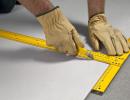Measure one seven times, cut off the meaning of the proverb. The meaning of the proverb is measure twice, cut once. Essays by topic
The famous proverb got me thinking: is it always necessary to measure seven times before cutting?
Everyone knows the proverb “measure twice, cut once.”
Let us turn to the possible origin of the proverb. The very saying “measure seven times (originally “try on”), cut once” refers to a simple and quick action: cutting off a part of something. Proverbs originated among the people and have always been related to simple everyday realities. Our example is no exception: it probably talks about cutting
And sewing. Over time, the expression became “winged”, and its meaning became more generalized: think carefully about everything before performing an action. The proverbs “if you hurry, you’ll make people laugh” and “if you drive more quietly, you’ll go further,” have a similar meaning, urging people not to rush.
In fact, in such matters as sewing or driving, haste can lead to disastrous results.
Now imagine that this advice will be followed by a modern person: a teacher in a kindergarten, a controller on a tram, a saleswoman in a grocery store, and finally, a law enforcement officer who noticed a suspicious subject!
Consequences
They won't keep you waiting long. Many activities require quick decision making.
Well, should you do everything as you have to, without caring about the result? Of course no! Any important undertaking presupposes a willingness to bear responsibility.
Turning to the same folk sayings, we will find the saying “take your burden with you.”
Every activity requires preparation, but not every action requires thought.
Perhaps, in the modern environment, the right choice would be a quick resolution of controversial situations. Confidence in your own knowledge and skills is now important. To achieve success, you must be able to navigate the flow of information, persistently move towards your goal and, of course, never stop learning new things, constantly developing your abilities.
Essays on topics:
- Seven-year-old Alka lives in a new city built on the site of a village. Near the city there is a large ravine in which dandelions grow. One...
- There is no point in blaming the mirror if the face is crooked - Russian proverb. Indicated in the book “Proverbs of the Russian People” (1853) in....
- The magical land was created by the wizard Gurricap. He searched for solitude for a long time until he found a picturesque place. He surrounded the country with impassable mountains and...
- It rains constantly on Venus, and the sun appears once every seven years for only two hours. Thousands of days filled with rain...
- In the mid-50s, a new stage in the development of our country began. Nikita Sergeevich Khrushchev, having successfully criticized Stalin’s cult of personality, becomes...
- Peasant and front-line soldier Ivan Denisovich Shukhov turned out to be a “state criminal”, a “spy” and ended up in one of Stalin’s camps, like millions of Soviet...
- Count Alexei Tolstoy was predicted to have a brilliant future, but he abandoned his titles and positions for the sake of his love for a married woman. The chosen one of the young...
The wisdom of the proverb “Measure twice, cut once” lies in the fact that you first need to think about the matter, double-check your arguments, and then act. You can measure as many times as you like, but once you cut it off, you won’t change anything else. A proverb of centuries, expressing worldly wisdom, the wisdom of generations. It is necessary to provide for all options for resolving the problem, and not to act rashly.
For example, when I go to the store after school, I always pick up sweets: chocolate, cookies, ice cream. Arriving home, I sort out my purchases and realize that I have become a victim of marketing. I have absolutely no need for these products. You need to be able to use common sense and intelligence in time so as not to waste money. If in the store I thought about the need for these products, I would not take them, and, therefore, would not spend the extra money.
And how many cases have there been when you argue, prove that you are right, and then it turns out that you are wrong. An unpleasant aftertaste remains inside, but all you had to do was think about it, and then enter into an argument or not.
Yes, there are situations that require immediate decision making, but if you have time to think, you need to take advantage of it.
Any responsible business requires reflection, weighing all the pros and cons. It is necessary to resolve any issue thoughtfully, approach the situation responsibly, with numerous assumptions about the outcome of the event. When the job is done, it will be too late to measure.
We are reasonable people, endowed with intelligence and intelligence, which helps us to rationally approach solving a problem. After all, if you do everything in a hurry, then you can rush and make people laugh. It is enough to always be collected, ready for any task and prudent in your thoughts. Deduction and common sense have not been canceled. To achieve high results, you need to be able to predict the result; spontaneous decisions often do not lead to a good ending.
When we write a dictation, I always wonder whether I placed the punctuation marks correctly, or whether I inserted the wrong letter instead of periods, because a few hasty mistakes of mine will lead to an unsatisfactory grade for me. Besides, I will worry until I know the result. After all, once I hand over the notebook, I won’t be able to correct anything. And if I had taken my time and analyzed my decisions, then there would have been no reason to worry - I would have known that I wrote the text correctly.
This is how I understand the proverb: “Measure twice, cut once.”
How to understand the meaning of the proverb: “Measure twice, cut once”?
The meaning of this proverb is very simple and clear. Before making any decision, you first need to think carefully and weigh everything carefully. And only then make the only true and correct decision. Otherwise, the no less well-known saying may work: If you hurry, you will make people laugh!
In my understanding, this proverb warns against hasty actions. Perhaps this proverb was invented by tailors and cutters. The meaning of this proverb is that before doing something, you need to think through everything many times.
This proverb is fraught with wisdom. You just have to listen to her. And its meaning is that you don’t need to make any vital decisions too hotly; sometimes time is of the essence. Therefore, a person should not forget that he has a head, which is given in order to think: first weigh everything ten times, the pros and cons, and then make the final decision.
Judging by my husband, he is always making something in his workshop and then redoing it five times. Either he will make it shorter, or he will cut it longer, instead of thinking everything over, weighing all the PROS and CONS, and then hitting it once with a hammer.
The proverb is very old and wise; it says that Russians have always been smart and wise people. Well, in what other language can you express your thought so figuratively - first think several times before doing something and then just do it. Everything here couldn’t be simpler.
Well, it’s very simple: Think twice, do it once (choosing the best option) I personally understand this. And unnecessary hasty movements, throwing, in this case, cutting, as a rule, do not lead to a good result. That is, once you cut it off, you can’t glue it back together, you can’t sew it together, you can’t return what you’ve done, and you need to think carefully before doing something that cannot be returned back.
The meaning of this old proverb is that before doing something, you need to think carefully, weigh the pros and cons, and only then do it. For example, you decide to sew a curtain, first make all the calculations, mark where to cut the fabric, check yourself, and then act. After all, if you cut in the wrong place, the curtain will turn out ugly.
The meaning of this proverb is clear and understandable. Before doing anything, think it over again, weigh the pros and cons, and only then make a decision. Because if you make a mistake, you will no longer be able to correct it.
The point is that first think carefully, weigh all the pros and cons, and then do it, otherwise many things cannot be corrected.
The proverb - Measure twice, cut once, makes you think about your actions. Make more correct and informed decisions. The meaning of this wisdom is that you need to think first, and then do (or not do).
I have known the meaning of this proverb since school. Then my mother often repeated it to me when I was doing my homework. She told me that before writing the correct answer, I should first check it several times, and then write it clean.
And the meaning of the proverb can be described as follows. If you do something, don't do it in a hurry. Think it over, weigh it, and then make a decision or act.
The meaning of this proverb is that before making any decision, you should first think carefully and weigh everything, so as not to regret the hasty decision in the future. Because mistakes made can have consequences.
Antonova Veronika Alexandrovna
Fairy tale “Measure twice, cut once.”
Once upon a time there lived one Hare. And this Hare was a cheerful, kind fellow, he willingly took on any task, but he just didn’t like to figure it out for a long time...
One Once his stool broke, and the scythe decided to make himself a new, good one.
So the Hare picked up an ax, a saw, a hammer and nails, one, two - and it’s done! The stool turned out great, but... since the Hare did not think for a long time and did not properly measure the length of the legs, one leg turned out to be longer than the others.
A, - said the Hare, - and that will do.
Here one Once his friend the Hedgehog came to visit the Hare. They sat down to drink tea, the Hare put the samovar and cups on the table.
Wait, dear friend, - said the Hare to the Hedgehog, - now I will treat you to such delicious jam, which you have never tried before!
With these words, the Hare stood up on a stool and reached for the jam, which stood on the very top shelf of the cupboard. But, since the stool was swaying strongly (one of its legs was longer than all the others), the Hare could not resist and fell to the floor with a great roar. What happened here! The jar of jam also fell and broke, the jam spread all over the floor, and the Bunny himself hit his head very hard, so that a huge bump appeared on his forehead!
Nasty stool! - the scythe screamed, - oh, oh, how painful it is!
The hedgehog helped the unfortunate man get to his feet, and even helped clean up the broken pieces and spilled jam from the floor.
It’s all the stool’s fault, it threw me off,” the Hare complained.
“Come on, let me take a look,” asked the Hedgehog. And everyone knows that Hedgehog was a jack of all trades. - Yes, your stool has one leg longer than the other! That's why you fell off it!
How did you measure the boards like that?
“I didn’t measure them at all,” admitted the Hare. - What for? I have squinty eyes...
The hedgehog began to groan and assure his friend that you must always do everything exactly, otherwise you will always fall and get bumps on your head.
-Measure seven times, cut once, – he said.
Yes, I’ll quickly fix everything right now, - said with a scythe and ran skipping for a saw.
And he shortened the long leg of the stool, again without measuring anything.
That's all! – the Hare was happy.
But for some reason the stool wobbled again...
How naughty!
Hedgehog carefully looked at the work and said:
Oddball! Now you've made it too short!
No problem! - the Hare reassured him, and began to align the other three legs with this...
But his creation again did not want to stand straight.
Eh, eh, master,” Hedgehog just shook his head.
But the Hare no longer listened to the Hedgehog. He sawed and sawed... At first, three legs were longer than the other, fourth leg, but as soon as he sawed them, it turned out that now they were shorter, and the other was longer than all the others... So he sawed for a whole hour, until the legs, alas, , there was almost nothing left. The stool has become very low, and instead of legs there are only small, uneven stumps...Who would sit on such a thing?
What did you do, brother? – the Hedgehog asked the Hare.
The hare scratched the back of his head and spread his arms... Finally, he stopped and saw what he had done.
I don’t understand how this happened.
I'll have to give you something that no one can do without. one true master! - Hedgehog said mysteriously, - but remember that this thing is magical.
And the next day the Hedgehog brought the Bunny... A RULER!
Keep it and take care, it will come in handy many times! – said the Hedgehog, - but most importantly, remember - measure seven times, cut once!
Philologist, candidate of philological sciences, poet, member of the Union of Writers of Russia.
Publication date:11/14/2018

In the souls of Russian people there lives an eternal craving for extremes. We have heard a lot about the maximalism of our compatriots all over the world. “It’s either all or nothing,” we think, often preferring a risky adventure to years of patient waiting. Meanwhile, national experience proves that it is unacceptable to forget about common sense.
The proverb warns us against making spontaneous decisions and reminds us that we must weigh every step and foresee the consequences of our actions in advance.
A similar warning can be heard from the lips of a mother who learned from her son that he was going to get married. It will be borne in mind that it would be necessary to take a closer look at the chosen one, observe her behavior in a variety of life situations, before making the final choice.
In business, the use of an idiom is appropriate when talking about unexpected plans of partners. For example, old friends opened a chain of cafes. A few years later, one of them decides to start something more original. He announces that he is leaving the company and opening a bookstore. "Wait a minute! – another warns him. – The demand for books is low, but people want to eat at any time. Seven times measure cut once!".
Origin of the proverb
Not a single dictionary reveals the secret of the birth of the expression, but, according to V.I.’s guess. Dahl, it, like many others, came from the professional sphere (in this case, from the everyday life of tailors). The picture is very clear: by incorrectly measuring a piece of fabric for a pattern and immediately cutting it off, the unlucky tailor only spoils the material: it will not be possible to sew something worthy from the resulting scrap.
It is curious that in the old days the folk teaching was pronounced differently: “measure once, cut once.” It was understood that every undertaking should be thought out so much that later it would not be necessary to redo everything. Simply put, I thought about it - I did it. However, practice has shown that once is not enough for our people. Hence the need to try on (that is, think) as many as 7 times, instead of once.
Since healthy prudence has always been a stabilizer of relationships, there are many sayings and phraseological units about it. Instead of the phrase “measure 7 times, cut once,” it is permissible to express concerns like this:
- don’t cut from the shoulder;
- If you don’t know the ford, don’t poke your nose into the water;
- don’t go into hell ahead of your dad;
- whoever drives more quietly will go further;
Peoples living on the territory of the Russian Federation have synonymous idioms. Ossetians say: “Chew the word before you blurt it out.” The Udmurts warn: “First look at your step, then step.”
Foreigners remind us of prudence in their own way:
- look before you leap (English);
- don't throw stones if you live in a glass house (French)
- think first, then start (German).
Not everyone considers everyday caution an undoubted virtue. Sometimes you need to act decisively, that is, “strike while the iron is hot.” Forethought and long calculation are appropriate in matters that are important, but not urgent. But when there is an enemy army under the walls of a fortress, you need to enter into battle immediately: headlong and without hesitation. By giving a decisive rebuff to circumstances, you often get more than you put at stake. For “he who does not take risks does not drink champagne.”






